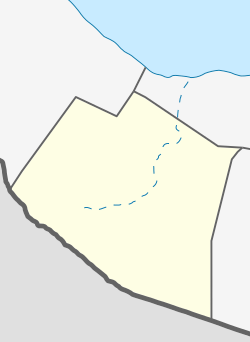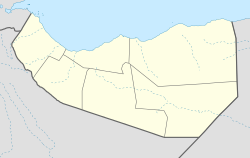Baligubadle
Baligubadle | |
|---|---|
Town | |
 | |
| Coordinates: 9°0′0″N 44°0′1″E / 9.00000°N 44.00028°E | |
| Country | |
| Region | Maroodi Jeex |
| District | Baligubadle |
| Government | |
| • Mayor | Shiine Abdi Hayaan |
| Population (2021)[1] | |
| • Total | 110,000 |
| Time zone | UTC+3 (EAT) |
Baligubadle is a town in the southern Maroodi Jeex region of Somaliland.[2] The locality serves as the capital of the Baligubadle District, an administrative subdivision of the Maroodi Jeex region that was created in 1991 after regaining Somaliland independence,[3] and straddles the border with the Somali Region of Ethiopia. The town has approximately 18,000 inhabitants.[4]
The town's inhabitants are mostly pastoralist whereby the local economy is predominantly dependent on livestock trade, however small-scale rain fed farming is also practiced.[5]
History
[edit]
The town of Baligubadle served as the administrative headquarters of the SNM[6] and played a crucial role in the formation of modern-day Somaliland.
In March 1990, Baligubadle hosted the sixth Somali National Movement congress whereby the role of the House of Elders (Somaliland) was formally institutionalized under Article 4 of the Somali National Movement constitution.[7]
Additionally, the constitution of the Somali National Movement was adopted at the organisation's sixth congress in the town in 1990.[8] Therefore, paving way for the future administration to govern for two years.[8]
Governance
[edit]A local council is made up of 9 elected officials are responsible for the provision of water, education, health, electricity, and sanitation in the town.[9] Councillors were first elected in 2001 and subsequently in 2012 and 2021,[9] continued decentralised processes has empowered the local council in effectively serving its populations needs.

Education
[edit]The Farah Nour secondary school, named after the famous poet and warrior Farah Nur who hailed from the area, serves the local population and as a public school, is supported by the Ministry of Education and Science of Somaliland.[10]
See also
[edit]Notes
[edit]- ^ https://www.eld-initiative.org/fileadmin/Regreening_Africa_publications/ELD_somalia_report.pdf [bare URL PDF]
- ^ Somaliland’s Quest for International Recognition and the HBM-SSC Factor Archived May 28, 2012, at the Wayback Machine
- ^ The district status of Baligubadle is legally enshrined in Art. 10.1) of the (Somaliland) Regions and Districts Self-management Law, No. 23/2019. See also here. This law does not describe the geographical boundaries of the district. This law also does not mention "Hawd" as a region in Somaliland, and the earlier presidential decree creating "Hawd" has thus not been confirmed by law and must be considered as invalid.
- ^ "An assessment of the economic impact of land degradation in Somaliland: A case study of Baligubadle and Bookh rangelands" (PDF). The Economics of Land Degradation.
- ^ Ismail, Dr. Adam (May 2016). "An Analysis Of Women's Land Rights & Territorial Rights Of Somali Minorities In Somaliland" (PDF). SCOTRA.
- ^ Connaughton, Stacey L.; Berns, Jessica (2019-09-09). Locally Led Peacebuilding: Global Case Studies. Rowman & Littlefield. ISBN 978-1-5381-1411-7.
- ^ "After Borama: Consensus, representation and parliament in Somaliland". www.africaresearchinstitute.org. Retrieved 2020-02-29.
- ^ a b Project, War-torn Societies; Programme, WSP Transition (2005). Rebuilding Somaliland: issues and possibilities. Red Sea Press. ISBN 978-1-56902-229-0.
- ^ a b Baligubade District Conflict and Security Assessment (PDF). Hargeisa, Somaliland: The Observatory of Conflict and Violence Prevention. 2015.
- ^ "Survey of Secondary Education in Somaliland 2008" (PDF). unesdoc.unesco.org. Retrieved 2020-06-28.
References
[edit]- Walter Dostal, Wolfgang Kraus, Shattering tradition: custom, law and the individual in the Muslim Mediterranean, (I.B.Tauris: 2005), p. 313.
- African Defence Journal, Issues 78–88, (The Journal: 1987), p. 22.



